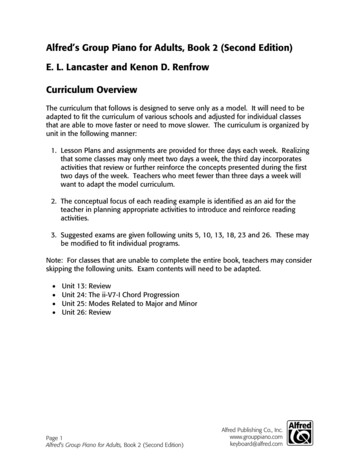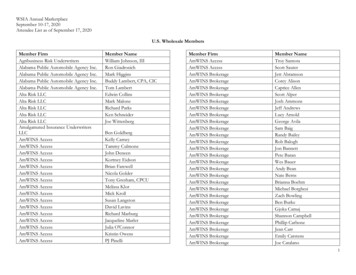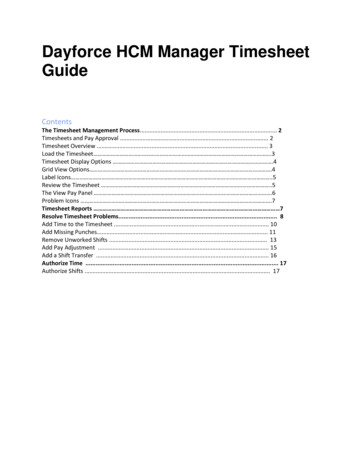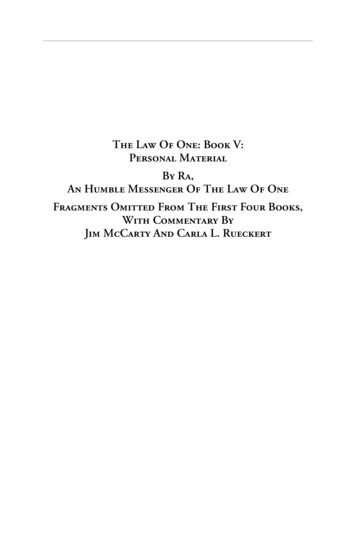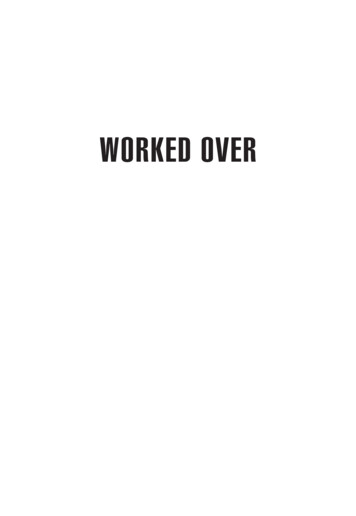
Transcription
WORKED OVER9781541618343 HCFP.indd 17/7/20 9:45 AM
ALSO BY JAMIE K. McCALLUM:Global Unions, Local Power:The New Spirit of Transnational Labor Organizing9781541618343 HCFP.indd 27/7/20 9:45 AM
WORKEDOVERHow Round-the-Clock WorkIs Killing the American DreamJAMIE K. McCALLUMNew York9781541618343 HCFP.indd 37/7/20 9:45 AM
Copyright 2020 by Jamie K. McCallumCover design by Chin-Yee LaiCover image copyright Michael Cogliantry / Getty ImagesCover copyright 2020 by Hachette Book Group, Inc.Hachette Book Group supports the right to free expression and the value of copyright.The purpose of copyright is to encourage writers and artists to produce the creative worksthat enrich our culture.The scanning, uploading, and distribution of this book without permission is a theftof the author’s intellectual property. If you would like permission to use material fromthe book (other than for review purposes), please contact permissions@hbgusa.com.Thank you for your support of the author’s rights.Basic BooksHachette Book Group1290 Avenue of the Americas, New York, NY 10104www.basicbooks.comPrinted in the United States of AmericaFirst Edition: September 2020Published by Basic Books, an imprint of Perseus Books, LLC, a subsidiary of HachetteBook Group, Inc. The Basic Books name and logo is a trademark of the HachetteBook Group.The Hachette Speakers Bureau provides a wide range of authors for speaking events.To find out more, go to www.hachettespeakersbureau.com or call (866) 376-6591.The publisher is not responsible for websites (or their content) that are not ownedby the publisher.Print book interior design by Jeff Williams.Library of Congress Cataloging-in-Publication DataNames: McCallum, Jamie K., 1977– author.Title: Worked over : how round-the-clock work is killing the American dream/ Jamie K. McCallum.Description: First edition. New York : Basic Books, 2020. Includesbibliographical references and index. Identifiers: LCCN 2020014358 ISBN 9781541618343 (hardcover) ISBN9781541618367 (ebook)Subjects: LCSH: Hours of labor—United States. Overtime—United States. Wages—United States. Work ethic—United States. Work-lifebalance—United States. Labor—United States.Classification: LCC HD5124 .M355 2020 DDC 331.25/70973—dc23LC record available at https://lccn.loc.gov/2020014358ISBNs: 978-1-5416-1834-3 (hardcover), 978-1-5416-1836-7 (ebook)LSC-C10 9 8 7 6 5 4 3 2 19781541618343 HCFP.indd 47/7/20 9:45 AM
FOR ASA9781541618343 HCFP.indd 57/7/20 9:45 AM
9781541618343 HCFP.indd 67/7/20 9:45 AM
The less you eat, drink and buy books; the lessyou go to the theatre, the dance hall, the public house; the less you think, love, theorize, sing,paint, fence, etc., the more you save—the greaterbecomes your treasure which neither moths norrust will devour—your capital. The less you are,the less you express your own life, the more youhave, i.e., the greater is your alienated life, thegreater is the store of your estranged being.—KARL MARX,Economic and Philosophic Manuscripts of 18449781541618343 HCFP.indd 77/7/20 9:45 AM
9781541618343 HCFP.indd 87/7/20 9:45 AM
CONTENTSOne Nation Under Work1CHAPTER 1The Hours of Inequality21CHAPTER 2Nickel and Timed53CHAPTER 3The Electronic Whip79CHAPTER 4Time Machines103CHAPTER 5More Than Money127CHAPTER 6Back to Work155CHAPTER 7We Control the Clocks177CHAPTER 8Labor’s Forgotten TIONix9781541618343 HCFP.indd 97/7/20 9:45 AM
9781541618343 HCFP.indd 107/7/20 9:45 AM
INTRODUCTIONONE NATION UNDER WORKThree days after Christmas in 1973 a group of workersdowned their tools and refused to work. They drew up a list ofgrievances and demands that they sent to management, andpromptly went on strike. They’d been working sixteen-hour days,weeks without a day off, and they had finally reached their limit.The lead troublemaker was William Pogue, who was frustratedby the scheduling demands put upon him and his fellow workers.“We’re just being driven to the wall!” he said. “No time for mental preparation . . . there’s no way we can do a professional job!”He felt like “a one-armed paper hanger trying to get started ininsufficient time!”1Pogue’s missive could easily describe a strike in some RustBelt steel mill. After all, tens of thousands of those workers—frustrated by similar complaints about speedup, technologicalinnovation, and unfair production demands—also struck duringthe seventies. But Pogue was orbiting the Earth. He and his twofellow astronauts were six weeks into what is to this day thelongest and last manned mission aboard the Skylab, the firstAmerican space station. They made painstaking observationsof the sun and Comet Kohoutek, performed extensive medical tests, took technical photographs of the Earth, and were ontrack to complete four dangerous space walks.19781541618343 HCFP.indd 17/7/20 9:45 AM
2WORKED OVER“We had been overscheduled,” Colonel Pogue later wrote.“We were just hustling the whole day. The work could be tiresome and tedious, though the view was spectacular.”2None of the astronauts had been in space before, and withinadequate time to acclimate, Pogue became nauseous. The crewunderstood it to be just a passing sickness and decided not toreport it to Mission Control. Unbeknownst to them, however,Houston was listening, spying on the astronauts’ conversations,and would later castigate them for keeping secrets. Resentmentbuilt over the micromanagement, and their communication withEarth became increasingly hostile.First Commander Jerry Carr, one of the three astronauts onboard the space station, emphasized the unreasonable imposition of the Earth-bound bosses. “On the ground, I don’t thinkwe would be expected to work a sixteen-hour day for eighty-fivedays, and so I really don’t see why we should even try to do it uphere.” The crew members gained a reputation for being notoriously irascible, even though their complaints echo those of manyworkers today. “We need more time to rest,” Carr said. “We needa schedule that is not so packed. We don’t want to exercise aftera meal. We need to get things under control.”3Then he switched off radio communication. The crew rebelledwith an unscheduled day off, stopping all craft maintenance,self-monitoring, and experiments. It was the first strike in space.Houston had a problem. With the flip of a switch, managers werecut off from the mission, and the workers were in charge, if onlyfor one placid day. Given the nature of their relationship to thecrew on Earth, which had no choice but to meet their demands,the astronauts enjoyed significant leverage, what sociologistscall “structural power.” Soon after their strike they negotiated areduced workload, fairer schedules, and greater control over theplanning of the mission. Houston gave them required tasks toperform, but the crew was able to plan how the work would becompleted. Pogue, described by coworkers as “a down-to-earth9781541618343 HCFP.indd 27/7/20 9:45 AM
ONE NATION UNDER WORK3kind of guy,” later said that the final weeks of the mission weremore enjoyable, allowing the crew time for “studying the Sun,the Earth below, and ourselves.”4Initial reports attributed the astronauts’ insubordination tolethargy or depression. But Pogue corrected that interpretation.The flight had made him “much more inclined toward humanisticfeeling toward other people, other crewmen,” he told Science Newsin 1985. “I try to put myself into the human situation, instead oftrying to operate like a machine.” Upon their return to Earth sixweeks later, the crew was met with a hero’s welcome. But althoughno laws prohibit strikes in outer space, unlike on the ground in theUnited States, the three astronauts faced the ultimate discipline:NASA ensured they never left the stratosphere again.5There’s no evidence the Skylab strike had any lasting impacton interstellar labor relations, and it remains the only organizedextraterrestrial work stoppage as far as we know. Can this vignettefrom over forty years ago tell us anything about our contemporarypredicament? NASA astronauts, professional space travelers, arehardly representative of working America. They had, however,voiced a concern about long hours, surveillance, and bad schedules that still resonates decades later among all kinds of workers.Overwork is the new normal, and millions of Americans feel thetime squeeze. Schoolteachers are increasingly moonlighting tomake ends meet—and not just in the summer. The manufacturing renaissance over the last two decades, especially in the South,has put more people to work at longer hours in automobile factories, the industry most identified with heroically shorteningthe workweek through strikes and collective bargaining. Eventhose who work the fewest hours today have increased their timeat work the most. Mandatory overtime is on the rise, especiallyamong those workers who are exempt from overtime pay regulations. And then there are the corporate professionals and CEOswho often put in sixty- and seventy-hour weeks, topping the listof overworked Americans.9781541618343 HCFP.indd 37/7/20 9:45 AM
4WORKED OVERContinual reports of protracted stressful hours across the occupational spectrum suggest a provisional symmetry among theoverworked, a unified mass yoked to a new reality of employment. Then again, not all overwork is created equal. Most professionals and managers, those who work the longest hours yetenjoy a greater degree of control over their time, live entirelydifferent lives from those average workers forced into an endlessgrind. They typically guard their long hours, profitable as theyare, and rely on others to do the dirty work around the clock.Thus, focusing on overwork alone gives us only one part ofthe picture. In addition to long hours, workers suffer from irregular and unpredictable schedules that change at their employers’whims. And there’s also the mass of the so-called involuntarilyunemployed, constantly seeking, but not finding, enough workhours to survive. Consider the growing ranks of retail clerks, fastfood workers, home health aides, and others who comprise the80 percent of hourly workers whose jobs have atypical or variable schedules. Their hours are so frequently cut or extended thatthey cannot plan to live off one job but find it almost impossibleto hold down two.6Add to this list the gig economy serfs whose time is far moreon-demand than the be-your-own-boss adage suggests. Norshould we forget that many Americans are working “encorecareers” longer and longer into their twilight years, thanks tothe indebtedness and lack of savings of many boomers. Combinethose with long workweeks, those with erratic schedules, andthose delivering your midnight app order, and you have almosttwo-thirds of the American workforce out of sync with what wethink of as a “typical” workday.7These three features—overwork, unstable schedules, and a lackof adequate hours—define the paradoxical time signature of theworking life today, especially for low-wage workers. By considering these different dimensions together, we see a fundamentallydivided labor force. Some are always on, others are scrambling to9781541618343 HCFP.indd 47/7/20 9:45 AM
ONE NATION UNDER WORK5the next job, and still others are spending hours and hours justlooking for more work, a job in and of itself. There was no simpleacross-the-board extension of work hours. Instead, the unequalredistribution of our labor time reflects deepening economic insecurity and social inequality.This inequity was brought into sharp relief when the coronavirus pandemic hit the United States in the winter of 2020,just about the time this book went to press. Though my researchwas already completed by that time, the first few weeks of thecrisis suggested that it was deepening preexisting inequalities inways that mirrored the patterns I had observed. White-collarprofessionals, many of whom were able to transition to remotework, struggled to keep up with demanding jobs plus, in manycases, at least forty extra hours a week of childcare. Othersendured similar conflicts while on the front lines of the public health disaster. Nurses were prohibited from taking vacations, doctors were beckoned from retirement, and EMTs weredragooned into 24/7 shifts. Grocery store clerks, warehouse anddelivery workers, and low-wage security guards, none of whosejobs had provided them any cushion with which to weatherhard times, kept working at great risk to their health. And yet,they were the lucky ones. Millions of their working-class peerswatched their livelihoods evaporate overnight, with massive layoffs and record-setting unemployment claims that suggested theprecarious nature of even full-time workers. They were dependent upon labor for their very survival.As the country lurched toward a crisis set to rival the GreatDepression, it became clear that the depth of the economic disaster was peculiarly American. Governments across the world actedto protect employment, paying salaries and wages to workerswhose industries were shut down. But America’s unemploymentsystem required onerous compliance with a bureaucratic jungle,plus a long wait, to receive coverage. To make matters worse,most Americans who lost their jobs also lost their healthcare.9781541618343 HCFP.indd 57/7/20 9:45 AM
6WORKED OVERIt was only through dozens of scattered strikes that those whostill had jobs were able to exercise secure conditions that allowedthem to work more safely and securely.It didn’t have to be this way. At the heart of this book is a deceptively simple question: Whydo Americans lack so much control over the hours of their labor,and how can we reverse the trend?I’ve chosen to focus on the temporal dimension of our worklives because it’s a point of fundamental conflict in capitalist society. Whoever controls labor in any society also controls time.When we sleep, eat, raise children, spend time with our friends,bask in the sunshine, or take vacations is dictated by those whocontrol our work. Overwork has ripple effects on family life andpersonal health in untold ways, fraying the intimate relationshipsand bonds that bind societies together.These conflicts aren’t easily resolved with typical solutionslike higher wages, better safety conditions, or stronger labor law.They raise persistent questions that challenge the viability ofcapitalist society. If our time is so important to us, why is somuch of it in the hands of an employer? Or, increasingly, a computer scheduling algorithm? Why is our work time so unevenlydistributed? If we’re unhappy with our working hours, why dowe continue to perpetuate the cycle? Perhaps most crucially,do our varied experiences of work-time conflicts offer the potential for a universal struggle, a broad coalition against a commonenemy? The most prophetic and seductive visions of a revolutionary movement have always included a unity of workers, aclass cobbled together from the dispossessed and their would-beallies. If a shared experience of the nine-to-five was once thenorm, our lives are increasingly governed by a new rhythm dictated wholly by employers. Can the unjust hours of toil uniteus in a new mass movement to regain control over labor time?9781541618343 HCFP.indd 67/7/20 9:45 AM
ONE NATION UNDER WORK7Worked Over is my attempt to untangle these enigmas that havegnawed at me over the years.The return of overwork is an unexpected development inAmerican history. Though a more leisurely society was on the horizon for more than a century, we reversed course in the 1970s andslowly committed ourselves to long hours, even as they becameincreasingly unstable. From 1975 to 2016, the hours of all wageand salary workers increased by 13 percent, equivalent to aboutfive extra weeks of work per year. This figure hides quite a bit ofvariation, as I examine in detail throughout this book, but it’s astarting point for understanding an important historical change.This happened even as worker productivity increased dramaticallyduring the same period, and as all our peer countries decreasedtheir average work hours. Combine these trends with decades offlat or declining wages, and it becomes clear that workers are giving far more to the economy than they’re getting in return.I offer three general explanations for this historic shift. Aneconomic explanation suggests that massive inequality, higherthan that of any other country in the capitalist world, prohibited our wealth from translating into free time. A cultural explanation suggests that a new kind of work ethic that emphasizes“meaningfulness” has increased the subjective value we attachto work. (And if work is meaningful, isn’t more of it better?)The third explanation points to American politics. In the pastfour decades both major parties have pursued agendas that havecontributed to extending and worsening the hours of labor. Thepolicies that created such poor labor conditions for Americanworkers have been a shockingly clear example of bipartisanshipat a time when political polarization grabs most of the headlines.Together these trends, all of which emerged against a backdrop ofincreasing inequality and insecurity, contribute not only to howwe work, but also when, and why we do so damn much of it.But any notion of overwork can’t be measured in hours alone;it’s a relative and subjective designation. This book examines9781541618343 HCFP.indd 77/7/20 9:45 AM
8WORKED OVERhow our work time has not only increased, but how it has beenrestructured and controlled. We experience changes in the natureof work not as macroeconomic forces, but as personal infringements on our dignity, liberty, and pursuit of happiness. Nearlyeveryone I interviewed felt overworked even if they wanted morehours. Many articulated the sense that their work lives werebecoming more “intense.” They meant that, first, the time theyspend working—be it at long, irregular, or insufficient hours—makes them feel overly dependent on employers in their day-today lives or for their well-being. Second, timing matters too. Amajor source of stress was that work was too fast-paced, tied totighter schedules, and reliant on technologies that ensure workcreeps into nonwork time. Among high and low earners alike,there is a sense that we are more than ever under the influence ofwork, even when we’re technically off the clock.Professionals whose jobs demanded excessive hours, or whowere lured to late nights by bonuses and gifts, expressed a deepfrustration. “I feel tied to this company’s success,” said Olivia,who works in California’s technology sector. “It’s really exciting,but, yeah, a lot of us are driven by insecurity too. Like, if we’renot at work, we’ll miss out on an opportunity.” Popular and anecdotal discussions of overwork tend to focus on white-collar, highearning professionals like Olivia, even though similar schedulesare present across many industries.Overall, however, this book centers on those at the lower endof the pay scale, who report near-constant insecurity as well. As aclass of servants—providing food, childcare, healthcare, and transportation—their work schedules are often determined by the longhours of professionals, the habits of consumers, or the demandsof unregulated employers. Even if they work sporadically, or onlyat odd hours, they express their frustration in terms of overwork.They’ve gradually increased their hours over the decades andthey’re finally feeling it. “I work more than my dad did at the samejob,” said Amanda, a personal care attendant by day and travel9781541618343 HCFP.indd 87/7/20 9:45 AM
ONE NATION UNDER WORK9agent by night in rural Vermont. “He built a life though, somestability—what do I have to show for all those hours?”The American Dream offers what seems like a compellingpromise—work hard, get ahead. By now a mountain of evidencerefutes that simple formula. Amanda’s plight is all too common,as many Americans work excessively and still fall behind. Or,despite their best eff
1290 Avenue of the Americas, New York, NY 10104 www.basicbooks.com Printed in the United States of America . The work could be tire- . think of as a “typical” workday.7 Thes
